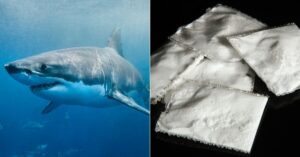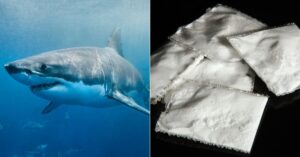
Spanish Police Seize 4 Tons Of Cocaine Hidden In Rice Sacks At Barcelona Port
July 29, 2024
122-Foot Yacht ‘Lovebug’ Capsizes On Maryland’s Rhode River, Crew Rescued
July 29, 2024

Marine biologists have found that sharks off the coast of Rio de Janeiro tested positive for cocaine, indicating alarming environmental issues caused by inadequate sewage treatment and illegal drug operations.
The Oswaldo Cruz Foundation, a well known scientific, technology, and health institute, conducted this pioneering study published in Scientific of the Total Environment.
Over the course of nearly three years, 13 sharp nose sharks were tested, and all of them contained high amounts of cocaine in their muscle and liver tissues.
The concentrations were up to 100 times higher than previously observed for other aquatic creatures.
Researchers believe the contamination is the result of inadequately handled sewage and hidden refining operations, as well as traffickers’ lost or dumped cocaine in the water.
Rachel Ann Hauser-Davis, a biologist from the IOC Environmental Health Assessment and Promotion Laboratory, stated that specific studies are required to determine the precise impact of this contamination on animals.
She expressed concern about possible impacts on shark growth, maturation, and reproduction, citing the liver’s role in embryo development.
The samples were gathered from September 2021 to August 2023 as part of a monitoring program to determine pollution’s impact on marine life.
Sharks, as apex predators, play an important part in the food chain and serve as “sentinel species” that can alert humans to potential environmental hazards.
Further study is required to determine the particular impacts of cocaine on sharks, but past studies have indicated that drugs such as antidepressants, heavy metals, and birth control medicines pollute aquatic ecosystems.
Brown trout, in particular, have been shown to acquire methamphetamine addictions, raising concerns about the potential impact on sharks.
Sara Novais, a marine ecotoxicologist at the Polytechnic University of Leiria’s Marine and Environmental Sciences Centre, termed the findings “very important and potentially worrying.
She emphasized that while the study is the first to identify cocaine in sharks, it expands upon previous research that has shown numerous contaminants entering streams around the world.
The study urges improved sewage treatment facilities and stricter regulations on illegal drug operations to reduce the environmental risk.
Reference: BBC, Aljazeera
Sharks Test Cocaine-Positive Off The Coast Of Brazil’s Party City Rio de Janeiro appeared first on Marine Insight – The Maritime Industry Guide
Source: Maritime Shipping News


